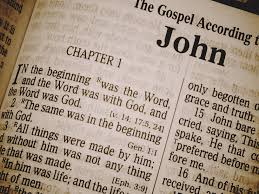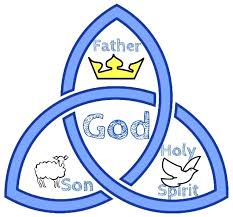John 5:25 – "Truly, truly, I say to you, an hour is coming, and is now here, when the dead will hear the voice of the Son of God, and those who hear will live."
 Welcome back, readers! We are continuing our study of John 5, where Jesus is revealing spiritual truths to the Jewish religious leaders.
Welcome back, readers! We are continuing our study of John 5, where Jesus is revealing spiritual truths to the Jewish religious leaders. Again, we notice the double use of the word 'truly' in this verse, which signifies that something profound or important is about to be shared. In this case, Jesus is shedding light on the topic of death, a concept he introduced back in verse 24.
In the scriptures there are two kinds of death (and life): physical and spiritual.
Physical death is the separation of the body and soul. Physical life is present when the soul and body are united.
Spiritual death is the separation of the soul from God. Spiritual life is present when the soul is united to God.
In this discussion, Jesus is speaking of spiritual death. Spiritually speaking, you could picture the entire world as a vast spiritual and moral graveyard, full of the stench of death and decay, rotting away in the darkness, without any sign of eternal life. Why is that? It's because each one of us was born in a state of sin, which separates us from God. All of us came into this world physically alive, but spiritually dead (Ephesians 2:1, Colossians 2:13).
But then the 'hour' or perfect time for redemption arrived, and God sent Jesus the Messiah into the world. When spiritually dead people hear the voice of Jesus (the gospel) and receive it, they transition from spiritual death to spiritual life. They rise up from the spiritual grave, whole and sound, full of eternal life because they are united to God, the source of all life.
Holy Spirit then works through each believer to spread the gospel message, bringing spiritual life to many others.
John 5:26 – "For as the Father has life in himself, so he has granted the Son also to have life in himself."
Father God is the source or fountainhead of all life. He himself does not derive life or existence from any other source, nor does he depend on anyone or anything to sustain him. He is unchanging; he always existed, exactly as he now is (Psalms 90:2, Malachi 3:6). It is not surprising that he identified himself to ancient Israel as "I AM" (Exodus 3:14), a phrase that denotes perpetual 'right now' existence/life.
Furthermore, He is frequently referred to in the scriptures as 'the living God' (Joshua 3:10, Jeremiah 10:10, Acts 14:15, etc).
 Before Jesus came to earth in a body of flesh, he had that same life, power and authority in himself as an equal member of the Godhead. But when he took on a body of flesh, he emptied himself of his divine attributes.
Before Jesus came to earth in a body of flesh, he had that same life, power and authority in himself as an equal member of the Godhead. But when he took on a body of flesh, he emptied himself of his divine attributes.Thus, Father God had to give the power and authority to raise people in spiritual life (and to pass judgment on the world) to Jesus during his incarnation, so he could fulfill his role as Messiah (John 1:4). This is what Jesus is explaining in this verse.
This was something the religious leaders in Jesus' day needed to understand. Spiritual life could not be obtained by the law. Rather, the law pointed to the need for a mediator or Messiah between God and man. Jesus had come as that Mediator; therefore God the Father had imbued Jesus and his word (the gospel) with the power of eternal life. If the Pharisees and Sadducees rejected Jesus, they were rejecting the only means of eternal life.
John 5:27 – "And he has given him authority to execute judgment, because he is the Son of Man."
We now come across the phrase 'Son of Man' which is used numerous times in the scriptures. By default the Messiah is divine, but he is also human and has a human nature. This is why the expression 'Son of Man' was used by the Jews to signify the Messiah.
God has given his Messiah authority or dominion, which denotes rule/government. God has appointed the Messiah to be King, to govern the world; to exercise the power of God himself.
This authority encompasses everything necessary to execute perfect judgment. It includes the power to physically raise humans from the dead, the ability to understand the actions/thoughts/motivations of each person's entire life, and the authority to sit in judgment of all living things.
As a side note, we do not possess any of the qualities needed for just judgment. Therefore, we are told NOT to judge one another (Matthew 7:1, Luke 6:37). To do so is to usurp the office of Christ; to unseat him and take his place of authority. Is that something you want to do? If not, then don't judge!
Acts 17:31 - Because he [God] has appointed a day, in which he will judge the world in righteousness by that man whom he has ordained [Messiah]; and of this he has given assurance unto all men, in that he has raised him from the dead.
Jesus is NOT a cold hearted, ruthless judge who delights in punishment. He has all the feelings of compassion and benevolence we could ever hope for in a judge. After all, he walked in our shoes: He subjected himself to life in a body of flesh. He was tempted by the enemy. He was part of a family. He went to school. He worked as a carpenter. He experienced pain, sorrow, hunger and fatigue as well as joy and happiness. He knew both friendship and betrayal. He was misunderstood, slandered and rejected. Simply stated, he knows what it is like to be human. Where would we find a more qualified or compassionate judge than Jesus?
And speaking of compassion, while we were yet sinners, Christ died for us. Though there was nothing good in us, he sacrificed his life so that we could be forgiven. He can never be accused of being heartless or indifferent to our sinful human state (Philippians 2:7-10).
John 5:28-29 – "Do not marvel at this, for an hour is coming when all who are in the tombs will hear his voice and come out, those who have done good to the resurrection of life, and those who have done evil to the resurrection of judgment."
The phrase 'do not marvel at this', indicates that the Jews were astonished. However, there is a difference of opinion about what astonished them.
Some think the Jews were astonished that Jesus was claiming to be the Messiah. How could the ordinary man standing before them be the Messiah and the judge of all the earth?
His family was quite ordinary. He was a simple carpenter. Jesus didn't seem to be a great military man; he was certainly not gathering an army to challenge Rome. He wasn't rich or even prosperous. Jesus spent his time with 'sinners' rather than associating exclusively with the elders of Israel.
Jesus certainly did not fit the image of the Messiah that the religious leaders had in their minds. Thus, they were astonished at his claim to be the Messiah.
Others think the astonishment is attached to the Messiah being given sovereign and supreme authority/power to raise the dead and execute judgment. The Jews believed this was something only Father God could do.
Regardless of which opinion is correct, Jesus goes on to assure the Jews that there will be a general resurrection and a universal day of judgment for both the righteous and the wicked. There will also be corresponding rewards and punishments in the next life.
Daniel 12:2 - And many of them that sleep in the dust of the earth shall awake, some to everlasting life, and some to shame and everlasting contempt.
 Now obviously, not every person who walked the earth is buried in a tomb. Some have been devoured by animals or disintegrated by explosions or lost at sea. The phrase 'in the tombs' is a figure of speech which simply refers to everyone who is already physically dead. Even though we cannot distinguish the atoms that made up their bodies, Jesus can. He is well able to reassemble them, and call them forth at the final resurrection.
Now obviously, not every person who walked the earth is buried in a tomb. Some have been devoured by animals or disintegrated by explosions or lost at sea. The phrase 'in the tombs' is a figure of speech which simply refers to everyone who is already physically dead. Even though we cannot distinguish the atoms that made up their bodies, Jesus can. He is well able to reassemble them, and call them forth at the final resurrection. The righteous are raised by virtue of their union with Christ; they rise to everlasting life. They also receive rewards, based on their earthly service. The wicked are raised by the power of Christ as judge; they rise to everlasting death and punishment, also based on their earthly life.
We can't help but notice there is no middle ground, no straddling the fence, no playing both sides, no demilitarized zone. You are either in one camp or the other.
Furthermore, Jesus indicates that the resurrection and subsequent judgment is not a 'maybe' thing, or an 'if' thing. It is a sure and certain thing, for each and every person. The 'hour' or the specific time for this event has already been determined by God the Father. It will happen, and YOU will be a part of it.
May this scripture be a reminder to us that we need to be about the Father's business TODAY, because none of us are guaranteed tomorrow!
John 5:30 – "I can do nothing on my own. As I hear, I judge, and my judgment is just, because I seek not my own will but the will of him who sent me."
I can do nothing on my own – Jesus the Messiah does nothing without the approval of the Father. Whatever he does, it is in complete agreement with the will of God.
As I hear – 'Hearing' refers to the things which the Father showed the Son (John 5:20). Jesus has come to communicate and reveal the will of God to mankind.
I judge and my judgment is just – 'Judge' means to determine or decide. When Jesus passes sentence on mankind at the end of time it will be true and just because he will determine their destiny according to what the Father wills and wishes. In other words, He will judge justly/righteously.
I seek not my own will, but the will of him who sent me - Jesus assures the Jews (and all mankind) that he has no hidden agenda or private design/aim of his own. The judgment of Jesus will be perfect, righteous and just because he is in complete unity with the Father and always acts according to his eternal will. Unlike human courts, there will be no mistrial or appeal when Jesus judges, because his judgment is perfect.
John 5:31 – "If I alone bear witness about myself, my testimony is not true."
According to the Law, there had to be two witnesses in order to establish something as a fact. The testimony that Jesus gave of himself was one witness. The Jewish leaders had a right to expect that the claims of Jesus would be confirmed by another source.
John 5:32 – "There is another who bears witness about me, and I know that the testimony that he bears about me is true."
The second confirmation of Jesus as the Messiah is God the Father. God spoke to the ancient prophets through Holy Spirit, describing the person, office and miracles of the coming Messiah. The Jews had read the Old Testament Messianic prophecies over and over and over. No person other than Jesus ever fit the descriptions given of the Messiah, and they knew it.
Again, we see the wickedness of the Jewish religious leaders. They claim to believe the holy scriptures are of God, yet they refuse to believe in Jesus, even though the scriptures clearly describe/testify of him.
God also testified about Jesus with an audible voice during his baptism (Matthew 3:17).
Finally, the miracles that Jesus performs testify/prove that he is the Messiah. No one could do miracles, except by God the Father.
In John 3:2, we saw that miracles drew the disciples to Jesus and convinced them that he was the Messiah. In the same way, the miracle of the paralytic man being healed should have been a sure sign to the religious leaders that Jesus was the Son of Man.
Jesus knows or is certain that the Father's testimony of him is true, because it is impossible for God to lie. Even the unbelieving Jews could not reject the testimony of the Father!
So again, the second confirming testimony that Jesus was the Son of Man, came from Father God.
Jesus is going to delve further into the testimony of the Father in verse 36. But before he continues, he wants to confront the Jews with a human testimony – that of John the Baptist.
John 5:33 – "You sent to John, and he has borne witness to the truth."
God the Father is the only other witness Jesus needs to confirm that he is the Son of Man, however, there is also human testimony – that of John the Baptist.
What makes John's testimony trustworthy?
- He is completely free from all self interest. He does not use his ministry or his reputation for his own personal gain. In fact, he urges his own disciples to leave him and follow Jesus.
- He is true, sincere and adverse to any kind of flattery. As evidence of this, we see him reproving Herod of sin at the hazard of his own life and freedom.
- John did not know who the Messiah was until God revealed it to him. God told John that when the Spirit descended upon a certain man and remained there, that man was the Messiah. Until that occurred, John did not know his identity (John 1:32-24). Because of this, there could be no collusion between Jesus and John for a false testimony.
Furthermore, identification of the Messiah was a revelation directly from God and it was confirmed by the voice of God. This confirmation is recorded by all of the other gospel writers (Matthew 17:5, Mark 1:11, Luke 3:22).
So if the Jewish leaders were looking for human testimony of Jesus as the Messiah, John was a legitimate source.
John did not seek out the Pharisees and Sadducees – they came to consult him! And John responded with the truth – Jesus is the Messiah. Yet the leaders turned around and rejected John's testimony.
Why would you seek the truth from a trusted source and then reject it, unless it wasn't what you wanted to hear?
John 5:34 – "Not that the testimony that I receive is from man, but I say these things so that you may be saved."
Jesus does not need the testimony of John to validate his role as Messiah. He brings it up for the sake of the Pharisees and Sadducees.
As we know, they chose to send a delegation to John to inquire about the Christ. John responded with a testimony of Jesus that was clear, full and explicit.
Jesus, desirous that the religious leaders would accept the gospel message, encourages them to accept the true witness that John had provided for them. If they will listen to the witness of their own choosing, they can still be saved (John 1:29).
Jesus did not and does not need the testimony of any man. But that does not mean that your testimony isn't powerful – it is!
The scriptures tell us that we overcome by the blood of the lamb and the word of our testimony:
Revelation 12:11 - And they overcame him [Satan] by the blood of the Lamb, and by the word of their testimony; and they loved not their lives unto death.
 Your testimony does two things. One, it encourages you. It reminds you that God can be trusted and depended on. As the enemy is attacking you, he tries to make you think that God is nowhere to be found and you are alone. But your testimony reminds you that God sticks closer than a brother; God came through for you in the past, and he will do it in your present circumstance as well. Your testimony builds up your own faith.
Your testimony does two things. One, it encourages you. It reminds you that God can be trusted and depended on. As the enemy is attacking you, he tries to make you think that God is nowhere to be found and you are alone. But your testimony reminds you that God sticks closer than a brother; God came through for you in the past, and he will do it in your present circumstance as well. Your testimony builds up your own faith.
Second, your testimony is a huge encouragement to others. It builds up their faith and gives them hope.
- Have you overcome cancer? Share that testimony with those who are battling that disease right now.
- Have you lived through a major loss like divorce or death of a spouse/child? Don't hide that experience away. Use it as a testimony that will help sustain someone else when they are at rock bottom.
- Have you been delivered from an addiction? That is a powerful testimony to others seeking freedom.
Your testimony can and will help someone else overcome. So don't keep it to yourself. Use it for the glory of God.
Let me offer you some encouragement:
Time has a way of quickly flying by. Before you know it, days turn into weeks. Summer turns to fall and then winter. (Notice I didn't say, 'winter turns into spring'. That particular event seems to take forever sometimes!) All joking aside, we lead such busy lives that some things we plan to accomplish just don't get done.
Take a few minutes to stop and examine your long term goals and plans. What are you doing for the kingdom of heaven right now? Is there something God whispered into your ear, but you just haven't done it yet?
If so, I encourage you to make that thing a priority. Our time on earth is like a vapor; it disappears as quickly as it came. So let's redeem whatever time we have left.
Let me offer you some relief:
Have you ever made a poor decision in life and it caused you to travel a difficult path? You might be tempted to think that was a waste, but let me offer you some relief – it wasn't! God can redeem every circumstance of our life, even when we mess up.
He can use that difficult time to draw us closer to him, to mature our faith, to impart wisdom and to give us a testimony that will help others to overcome. So don't despise your past mistakes. Use them for the glory of God and the good of others.
Let me offer you some strength:
There is an old saying, 'No good deed goes unpunished'. The meaning is that people who take a stand and do the right thing often suffer for it, instead of being rewarded.
But you and I know that Jesus, the perfect judge, knows everything that we do. When the final resurrection takes place, he will right every wrong and reward his saints for all they have done in this life. So strengthen your resolve to do what is right, no matter what the outcome, and let Jesus handle your reward.
